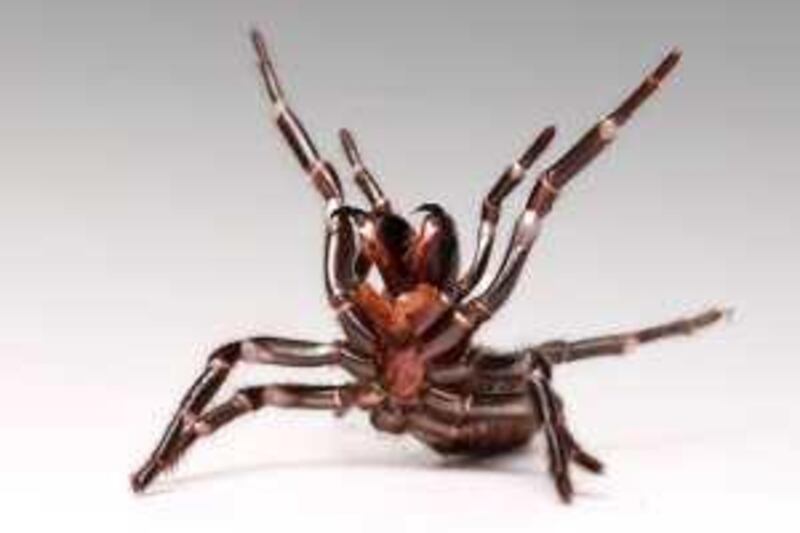SYDNEY // An army of venomous funnel-web spiders is on the march in Australia, invading homes and gardens in the country's biggest city, Sydney, after a period of unusually wet and humid weather. The damp conditions have sent these fearsome eight-legged creatures scurrying into porches, laundries and sheds seeking a cool, dry sanctuary. When threatened, the world's second deadliest spider strikes a chilling pose, as it rears up on its hind legs ready to strike with fangs bristling with venom.
"There is an infestation of funnel webs at the moment in the Sydney area because of unstable weather conditions. This year is worse than others and far more spiders are being caught in homes," said Rex Gilroy, co-ordinator of a public awareness project on dangerous spiders. Mr Gilroy has been fielding up to a hundred calls a week from worried homeowners since the start of January, compared to the occasional inquiry he received at the same time last year.
"The current weather pattern is the problem. There's a lot of moisture, which is ideal for the spiders to breed. It is followed by excessive heat. That sucks up the moisture from out of the burrows, forcing the spiders into homes for shelter and a dangerous time it is too," Mr Gilroy added. A bite can be agonising and if left untreated can be lethal. The quickest death ever recorded from a funnel web attack in Australia was just 76 minutes, the victim an elderly woman, although the development of reliable anti-venom has made fatalities exceptionally rare.
"There is extreme pain when the venom is injected into your system," said Mary Rayner, the general manager at the Australian Reptile Park 70km north of Sydney. "It is meant to be like acid going in and then you start feeling symptoms around the mouth, the tongue starts swelling and your body then starts producing copious amounts of liquids. You'll have foam around your mouth, severe sweating, a headache and nausea but ultimately death is through drowning with so much liquid in your lungs."
The park has a vast assortment of spiders collected from the public across the Sydney region. Funnel webs have large hooks at the end of their feet but their heavy bodies mean they are unable to jump or climb up smooth surfaces. Much to the alarm of homeowners, however, these marauding invertebrates can easily negotiate curtains and other fabric. Naturally, creatures so dangerous have become an instant hit with visitors to the reptile park and the young, eager faces pressed up against laboratory's glass window, were treated to an extraordinary spectacle as tiny droplets of venom dripped from the mandibles of a very aggressive spider, while being gently goaded by Ms Rayner with a suitably long pair of prongs.
The toxin is harvested through a glass pippet and freeze-dried before it is sent to a pharmaceutical company in Melbourne that manufactures anti-venom, which saves an estimated 300 lives in Australia every year. Peering cautiously through the glass was Charley White, seven, who was understandably anxious. "I like some of the spiders but I don't like the funnel web because they can hurt you really badly," he said.
The reptile park has recently started offering courses to help Australians conquer their dread of spiders and Ms Rayner said the early results had been encouraging. The wife of a paramedic, Louise Houlahan, believes that such trepidation has been hardwired into many people. "It's bred in us," she said. "We seem to have a lot of creepy crawlies and slithery things in Australia and we're brought up to know you have to be careful. I don't think we're a bunch of softies. I think everyone has a phobia of some sort, don't they?"
pmercer@thenational.ae





